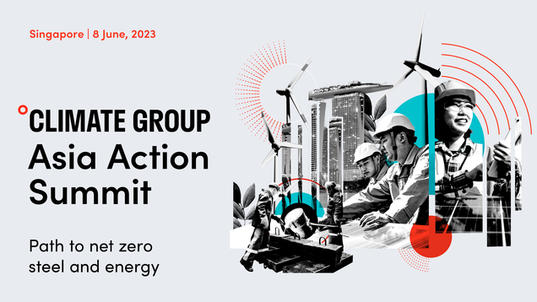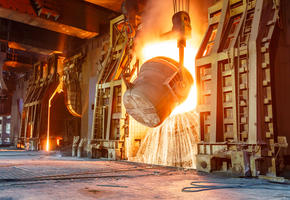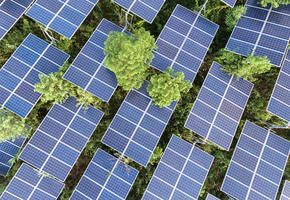In the first of our Asia Spotlight series, we interview our CEO, Helen Clarkson, on the role Asia plays in driving global ambitions towards net zero and the motivations behind Climate Group’s Asia Action Summit.
This is Climate Group’s first Asian focused summit. Why are you putting the spotlight on Asia?
We’re really excited to be taking our Action Summit series to Asia this year, hot off the heels from US Climate Action Summit in Washington DC and in the run up to our world-leading Climate Week NYC.
Asia is a huge focus not just for Climate Group, where we have offices in India and China and our campaigns represent a huge number of Asia-based businesses and global companies operating in the region, but also for the global push for decarbonisation.
Three-quarters of Southeast Asia’s expected increase in energy demand over the rest of the decade will be met by fossil fuels, expecting to lead to nearly 35% increase in CO2 emissions. With Asia acting as the supplier of goods and services for much of the world and being heavily reliant on fossil fuels, it’s essential that countries in the region can decarbonise quickly. This will help to deliver on global net zero goals, as well as corporate commitments to net zero.
Why are steel and energy such a big focus for the summit?
These are two heavy emitting sectors that can really deliver on decarbonisation in the right investment and policy landscape. Energy accounts for more than two-thirds of total greenhouse gas emissions globally, so every country must tackle these emissions if it’s to reach its own net zero commitments and help drive down emissions globally. Businesses have similar net zero commitments, but they rely on the countries in which they operate to deliver the renewable energy they need. At the moment the Asian market is lagging behind in the roll-out of renewables, so addressing this issue is critical to achieving global decarbonisation.
Asia is responsible for as much as 70% of global steel production. In China, steelmaking accounts for 15% of the country’s total carbon emissions, 14% in Japan and 12% in India. By moving towards greener methods of development, they can remove a significant proportion of emissions.
How is Climate Group driving sustainable change towards steel and energy?
We accelerate the transition through our two campaigns, RE100, which is focused on businesses committing to using 100% renewable electricity across their operations by 2050, and SteelZero, where organisations commit to buying and using 100% net zero steel by 2050.
RE100 has over 400 businesses as members, and over 150 of them are headquartered in Asia. In countries like South Korea and India we’re actively pushing for policy changes. The RE100 team recently reached out to the G7 climate representatives ahead of their meeting in Japan to emphasise the corporate demand for renewable electricity across G7 countries.
SteelZero now has over 30 members, and we recently welcomed CIMC TCREA as our first Chinese signatory. In India, our India Conclave event brought together business, government & civil society leaders to explore the demand and policy support for steel decarbonisation in the country. We also recently hosted our first event in South Korea, bringing together leaders from the entire value chain to discuss ways to drive steel decarbonisation.
China and India are both critical on the road to global net zero. What role will Climate Groups’ India and China offices play in this fight?
Our offices are working closely with their local counterparts, businesses, stakeholders, and government officials to deliver net zero for their country. Each geography has its own unique challenges and opportunities, and to be able to work with India and China, having a footprint on the ground there is essential. We have members from across our initiatives in both countries so we’re working with them to increase our membership, and where appropriate, to engage in policy conversations and agenda shaping. Our India team for example is being closely associated with the B20, in association with the G20 later in the year.
What do you hope to get out of this event?
The Asia Action Summit will be Climate Group’s first dedicated event in Asia for collaborating, connecting and collectively tackling two of the biggest climate and economic challenges in the region. We want to make sure that we have an open, lively conversation with our member community, business and industry leaders, politicians, regional governments and industry thought leaders about the challenges and opportunities that the region faces in decarbonising its energy and heavy industry sector. We’re really aiming to support the role of Asia in helping the world reach its net zero targets.
What role do businesses play in combatting climate change?
It’s often considered the responsibility of government to set the agenda and drive the energy transition. However, the role that businesses can and must play shouldn’t be understated. They bring scale, they bring speed. Many businesses are already leading the way and taking up the challenge that governments have failed to adequately address so far. Climate Group’s 500+ members are evidence of this.
The private sector is playing an essential role in accelerating the transition to net zero, by demanding renewable electricity and net zero products, and by greening their supply chain. Businesses are investing billions around the world to make these changes. This sends a clear signal to policy makers that leading corporates seethe danger of climate change, but also the opportunities in reaching net zero, and they’re calling for government policy to catch up with demand.
What would you like to see ahead of the G20 and COP28 later this year?
More action, fast. We’re really at a point now where each country needs to step up to the plate and say “we, and you, aren’t doing enough, we need to go further, and this is how we are going to do it”. We saw the G7 move forward with commitments on more renewables in a very encouraging step, but it still has no concrete plans for phasing out coal. This will be even harder in the G20 and COP. But setting out concrete roadmaps and frameworks for how each country will deliver net zero will be vital in the challenges ahead.
Make sure you register your interest to attend Climate Group Asia Action Summit.



